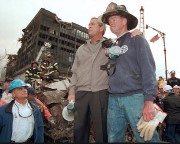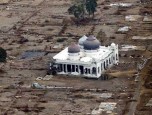 當我看電視新聞時,偶爾會看見某一個國家的領袖在公共場合與老百姓會面談話。有時候這不過只是給記者攝影的機會而已。但,有時候它的確是難忘的時刻。
當我看電視新聞時,偶爾會看見某一個國家的領袖在公共場合與老百姓會面談話。有時候這不過只是給記者攝影的機會而已。但,有時候它的確是難忘的時刻。
比方說個例子。2001年,9月11日,恐怖分子攻擊紐約“世界貿易大樓”。美國總統,喬治·布什,去現場參觀七十個小時以前大樓所存在的位置。布什總統和消防隊長,巴比·巴克,站在一塊兒,感謝紐約市的消防隊員,同時他們也鼓勵美國國民。
2004年,11月底,中國主席,胡錦濤,去看望一位艾滋病患者。藉着電視台,在十億中國人面前,胡主席一進門,帶着微笑,主動地伸出他的手,與艾滋病患者握手。此舉動表示中國對艾滋病患者新的看法和關懷。
 2005年元月,海嘯排排巨浪地由印度洋海底涌到亞洲的十一個國家的海岸以後,印度尼西亞的總統,Yudhoyono先生,前往災區。Yudhoyono 向災民表示關懷說,“我們要顯示我們的團結,我們的合一,克服在亞齊省災害之後的問題”。
2005年元月,海嘯排排巨浪地由印度洋海底涌到亞洲的十一個國家的海岸以後,印度尼西亞的總統,Yudhoyono先生,前往災區。Yudhoyono 向災民表示關懷說,“我們要顯示我們的團結,我們的合一,克服在亞齊省災害之後的問題”。
在以上所提的事例,國際領袖表示他和人民的同舟共濟,說老百姓的問題是領袖的負擔,老百姓的疼痛是領袖的責任。
以上的三件事情都很重要,但是在世界媒體之前,都是出現短暫,之後就不見了。我們都知道,世界領袖都被安全人員圍繞着,所以他們不能隨時和老百姓往來。
 這些都讓我想起,耶穌基督跟一般的領袖有很大的不同。耶穌天天親近老百姓。基督教的一個既重要又美麗的特點是耶穌“親自成了血肉之體”。耶穌天天走我們時常走的路上,坐我們時常坐的地上。耶穌經歷飢餓,失望,疼痛,試探。他面對過誹謗,困厄、疾病和死亡。耶穌“親自成了血肉之體”(希伯來書2:14)。這樣看來,《聖經新約》肯定耶穌基督與我們一樣接受了苦難,所以他理解我們的痛苦。
這些都讓我想起,耶穌基督跟一般的領袖有很大的不同。耶穌天天親近老百姓。基督教的一個既重要又美麗的特點是耶穌“親自成了血肉之體”。耶穌天天走我們時常走的路上,坐我們時常坐的地上。耶穌經歷飢餓,失望,疼痛,試探。他面對過誹謗,困厄、疾病和死亡。耶穌“親自成了血肉之體”(希伯來書2:14)。這樣看來,《聖經新約》肯定耶穌基督與我們一樣接受了苦難,所以他理解我們的痛苦。
關於自己,耶穌曾經說他“連枕頭的地方都沒有”(馬太福音8:20)。意思是他不擁有自己的房子,不擁有任何財產。但是耶穌接觸麻風病患者,與妓女談話,與窮人吃飯。耶穌跟自以為是的辯論。耶穌讓癱瘓病者走路,瞎眼的看見,飢餓的吃飽。耶穌“親自成了血肉之體” 。
也許您想知道,我為什麼要向您說這些。我心裡想着的是2004年12月26日,印度尼西亞的海嘯以及2011年日本的海嘯。光講印度尼西亞的海嘯,十一個國家,二十一萬多人失蹤死亡,兩千萬人失去家園。這種災難使得很多問題出現,如,“神知道這事嗎?”和“耶穌基督關心這些人嗎?”
 是的。基督徒深信神知道這事,我們也深信耶穌關心數百萬人的痛苦。《聖經》肯定,藉着耶穌基督,天上的神化身為人,參與與面對生命問題,如同您我一樣。我們面對生命苦難之時,就如那些經歷過海嘯的災民,耶穌基督理解他們,同情他們。耶穌體會每一個人的情感,嘆息和眼淚。耶穌知道萬人坑裡頭每一人的名字;他參加每一次葬禮;他同情每位失去孩子的父母;他喜愛每位孤兒。
是的。基督徒深信神知道這事,我們也深信耶穌關心數百萬人的痛苦。《聖經》肯定,藉着耶穌基督,天上的神化身為人,參與與面對生命問題,如同您我一樣。我們面對生命苦難之時,就如那些經歷過海嘯的災民,耶穌基督理解他們,同情他們。耶穌體會每一個人的情感,嘆息和眼淚。耶穌知道萬人坑裡頭每一人的名字;他參加每一次葬禮;他同情每位失去孩子的父母;他喜愛每位孤兒。
聽眾朋友,請您取得一本《聖經》,閱讀新約里的四福音書。請您遇見耶穌,認識這位化身為人的神,這位參與一般人(像您和我)生命的神,這位理解我們痛苦的神,這位“親自成了血肉之體”的神。
As I watch the news on television, occasionally I see the leader of a country make a personal appearance in public. Some of these photo-ops are memorable.
After the terrorist acts of September 11, 2001, President George Bush visited the site where the World Trade Center had stood only seventy hours earlier. President Bush stood with Fire Chief Bob Beck and thanked the firemen of New York City and reassured the American people.
In late November, 2004, as television cameras projected the scene to a billion people, China’s President Hu Jintao shook hands with an AIDS patient. This act signaled a new level of official concern about AIDS.
In January of 2005, some days after the tsunami surged from the depths of the Indian Ocean and battered the shores of eleven countries, Indonesian president Yuhoyono visited hard-hit Aceh in Sumatra. President Yudhoyono said he wanted to “show our solidarity, our unity, our togetherness to overcome the problems after Aceh was hit by the disaster.”
In each case, the world leader expressed oneness with his countrymen and said that their problems were his problems, their pain was his pain.
Each of these events, important though they were, were short-lived. We know that all world leaders are surrounded by security personnel and that they can hardly live among common people like you and me.
One of the things that makes Jesus Christ so special, however, is that Jesus was in close contact with normal people every day. One significant and beautiful facet of Christianity is that Jesus Christ shared our humanity. This means that Jesus walked where we walk, he sat where we sat. He faced hunger, disappointment, pain and temptation. He faced defamation, distress, disease and death. Jesus shared in [our] humanity (Hebrews 2:14). Thus the New Testament affirms that Jesus Christ suffered as we suffer and that he understands our pain.
Of himself, Jesus said that he had no place to lay his head (Matthew 8:20) indication that he possessed no personal home, no personal anything. Yet Jesus sat with lepers, spoke with prostitutes, ate with public outcasts and argued with self-righteous leaders. Jesus healed the lame, gave sight to the blind and provided food for the hungry. Jesus shared in our humanity.
Why do I mention this today, you may wonder. I am thinking of the tsunami in Indonesia in 2004 and the one in Japan in 2011. I am thinking of the victims in eleven countries—over 210,000 deaths, over two million people displaced (following the Indonesian tsunami). The questions come: Does God know? Does Jesus care?
Yes, Christians believe that God knows and that God cares about our sufferings. The Bible affirms that in the body of Jesus Christ, deity became a human and faced life just like you and I face it. When we face tragedies of life, as those who lived through the tsunami now face them, Jesus Christ understands. Jesus understands our every emotion, every sigh, and every tear. He knows the names of every person in the mass graves; he is present at every funeral; he shares the grief of every parent whose child died; he loves every orphan.
Obtain a copy of the Bible and read the gospel accounts in the New Testament. Meet Jesus Christ and get to know this deity who became a man, who entered into life as you and I know it and who understands our suffering because he shared in our humanity.
【天災】五:生還者的依靠——耶穌成了血肉之體
Natural Disasters (5): Comfort for Survivors–Jesus Became Flesh
作者:謝德華 ©By Edward Short
World Christian Broadcasting
